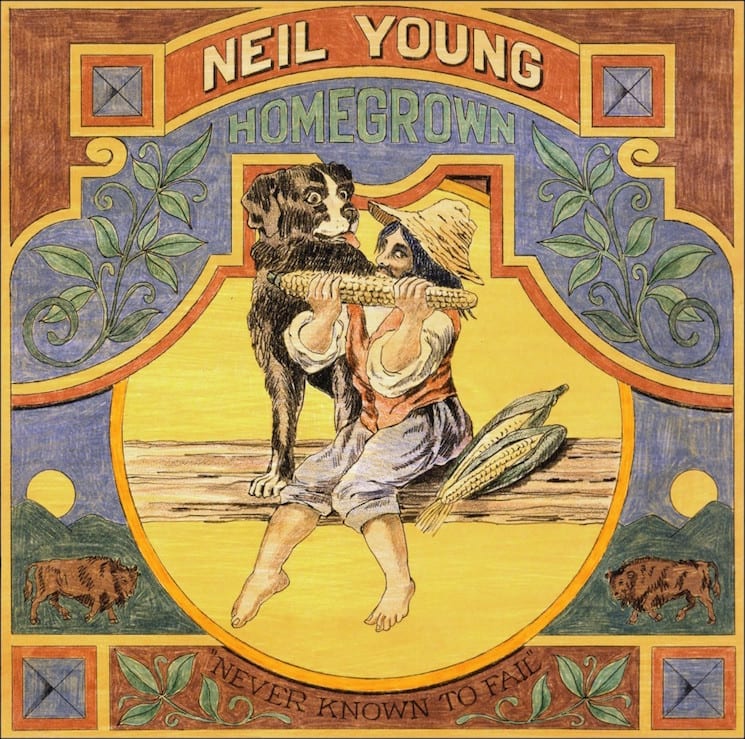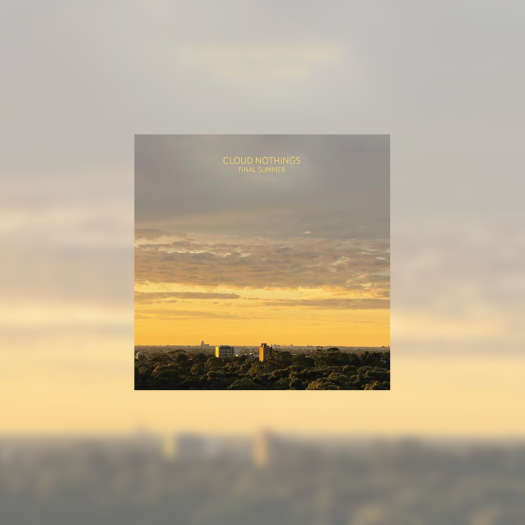Of the all the archival projects Neil Young has unearthed from the vault for his Special Release Series, the fabled Homegrown has been one of the most anticipated. Set for release in 1975, but ultimately shelved in favor of Tonight's the Night, the album has long been held by Young as a deeply personal body of work, ultimately too "revealing to expose in the freshness of those times."
Young has most recently called Homegrown "the unheard bridge between Harvest and Comes a Time," but the album's roots run much deeper. Five of its tracks — and even more from the sessions — would be transplanted to become standouts on future releases. The remaining seven have never received official release, and are better known in the tape-trading world Young himself will soon explore. Real Neil heads have spent years speculating as to what Homegrown's tracklist could include, but the one now deemed official lands Young an expectedly fitting addition to this particularly fruitful period of his career. Not unlike the aforementioned Tonight's the Night, a particular heaviness pervades the listen, but it differs in how Young feels the weight of romantic love compared to that shared by a band brotherhood.
The personal element of Homegrown that Young has long alluded to primarily stems from the dissolution of his relationship with actress Carrie Snodgress, and Young juxtaposes songs of loving and leaving to great effect, creating the album's most stirring moments.
Young opens the album ready to walk away on languid opener "Separate Ways," before the country charm of "Try" finds him looking to make things work, propped up by Emmylou Harris's harmonies, Levon Helm's steady drums and Ben Keith's liquid pedal steel.
Solo piano vignette "Mexico" finds Young pondering love over gorgeous melody before his mind wanders south: "Gonna take my time, go down slow." On the stark "Kansas," he is raw, yet reserved, his vocals quiet and affecting, and his harmonica slyly snarling in recalling a one-night stand "In my bungalow of stucco / That the glory and success bought." He thinks himself, "It doesn't matter if you're the one / We'll know before we're done."
Another two tracks fresh from the vault work primarily to lighten Homegrown's emotional load. "We Don't Smoke It No More" is a blazing blues jam on which the whole band sound like they've been up to the exact opposite, while "Vacancy" pairs Young's country stomp with some of his '60s songwriting flair as its urgent, half-time chorus gives way to some kaleidoscopic noodling.
The album's title track, which Young would rerecord with Crazy Horse for 1977's American Stars 'n Bars, loses its stoned and stately pace for a more down-home feel. "White Line," which Young would track with the Horse for 1990's fuzzed-out Ragged Glory, appears here as a gentle duet with Robbie Robertson. Young's lifelong pursuit of audio fidelity excellence makes this song shine: as he commands the left stereo channel, Robertson is left alone in the right, putting great care into the phrasing of his plucky lead guitar.
"Little Wing" and "Star of Bethlehem," both appearing here with new mixes, also get new life thanks to Young reseeding them for what was likely their original sequencing. The former's harmonica squalls and gentle guitars are served much better as a comedown than in opening 1980's Hawks and Doves, while Harris and Young's lilting harmonies on the latter work in similar fashion closing the listen.
Through songs now considered longtime favourites, and ones that will now find wider audiences, Homegrown is now free to stand as a more organic, lovelorn harvest of the personal turmoil that influenced Young's revered mid-'70s output.
(Warner)Young has most recently called Homegrown "the unheard bridge between Harvest and Comes a Time," but the album's roots run much deeper. Five of its tracks — and even more from the sessions — would be transplanted to become standouts on future releases. The remaining seven have never received official release, and are better known in the tape-trading world Young himself will soon explore. Real Neil heads have spent years speculating as to what Homegrown's tracklist could include, but the one now deemed official lands Young an expectedly fitting addition to this particularly fruitful period of his career. Not unlike the aforementioned Tonight's the Night, a particular heaviness pervades the listen, but it differs in how Young feels the weight of romantic love compared to that shared by a band brotherhood.
The personal element of Homegrown that Young has long alluded to primarily stems from the dissolution of his relationship with actress Carrie Snodgress, and Young juxtaposes songs of loving and leaving to great effect, creating the album's most stirring moments.
Young opens the album ready to walk away on languid opener "Separate Ways," before the country charm of "Try" finds him looking to make things work, propped up by Emmylou Harris's harmonies, Levon Helm's steady drums and Ben Keith's liquid pedal steel.
Solo piano vignette "Mexico" finds Young pondering love over gorgeous melody before his mind wanders south: "Gonna take my time, go down slow." On the stark "Kansas," he is raw, yet reserved, his vocals quiet and affecting, and his harmonica slyly snarling in recalling a one-night stand "In my bungalow of stucco / That the glory and success bought." He thinks himself, "It doesn't matter if you're the one / We'll know before we're done."
Another two tracks fresh from the vault work primarily to lighten Homegrown's emotional load. "We Don't Smoke It No More" is a blazing blues jam on which the whole band sound like they've been up to the exact opposite, while "Vacancy" pairs Young's country stomp with some of his '60s songwriting flair as its urgent, half-time chorus gives way to some kaleidoscopic noodling.
The album's title track, which Young would rerecord with Crazy Horse for 1977's American Stars 'n Bars, loses its stoned and stately pace for a more down-home feel. "White Line," which Young would track with the Horse for 1990's fuzzed-out Ragged Glory, appears here as a gentle duet with Robbie Robertson. Young's lifelong pursuit of audio fidelity excellence makes this song shine: as he commands the left stereo channel, Robertson is left alone in the right, putting great care into the phrasing of his plucky lead guitar.
"Little Wing" and "Star of Bethlehem," both appearing here with new mixes, also get new life thanks to Young reseeding them for what was likely their original sequencing. The former's harmonica squalls and gentle guitars are served much better as a comedown than in opening 1980's Hawks and Doves, while Harris and Young's lilting harmonies on the latter work in similar fashion closing the listen.
Through songs now considered longtime favourites, and ones that will now find wider audiences, Homegrown is now free to stand as a more organic, lovelorn harvest of the personal turmoil that influenced Young's revered mid-'70s output.




